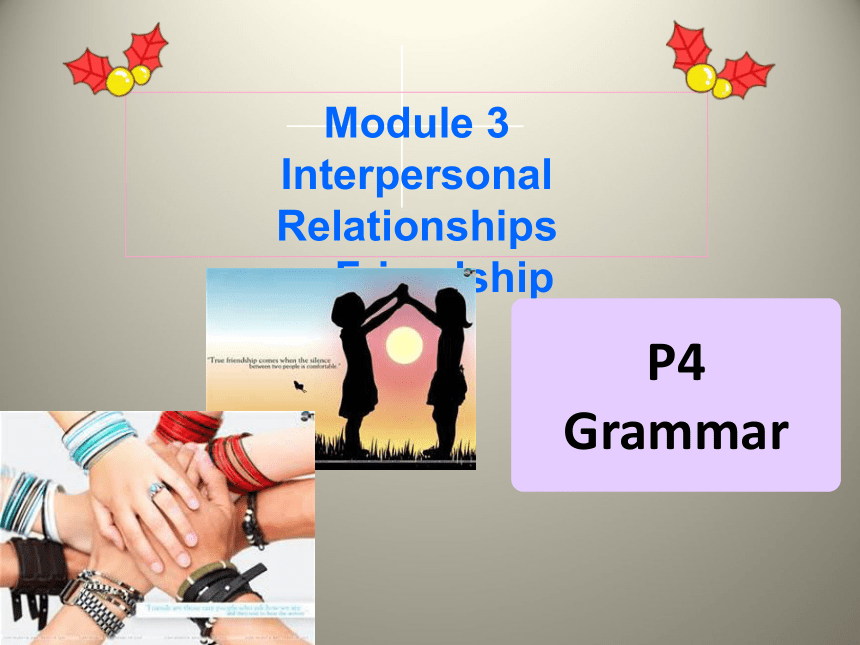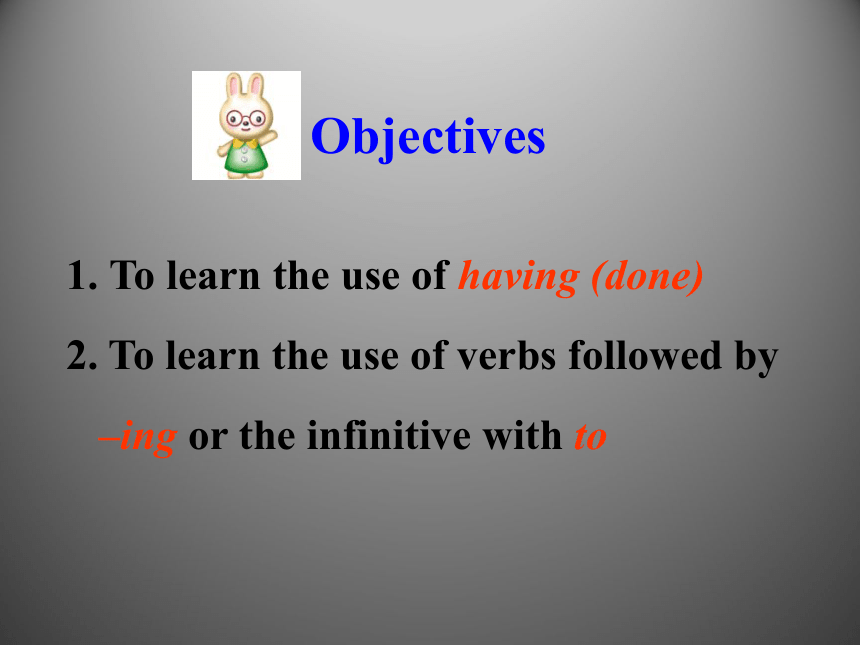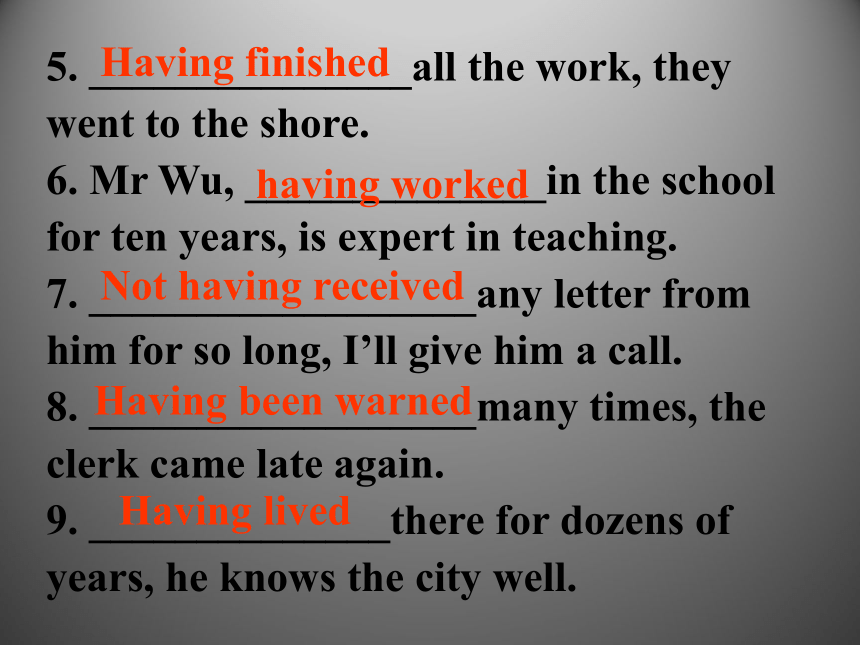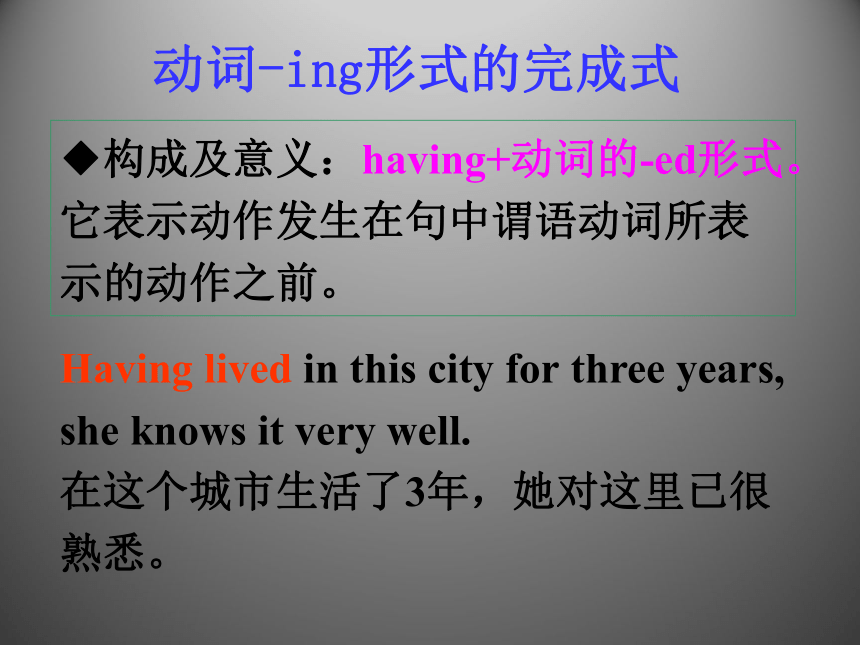外研版选修六Module 3 Interpersonal Relationships -- Friendship Grammar教学课件(共47张)
文档属性
| 名称 | 外研版选修六Module 3 Interpersonal Relationships -- Friendship Grammar教学课件(共47张) |  | |
| 格式 | zip | ||
| 文件大小 | 2.0MB | ||
| 资源类型 | 教案 | ||
| 版本资源 | 外研版 | ||
| 科目 | 英语 | ||
| 更新时间 | 2018-03-22 15:17:34 | ||
图片预览












文档简介
课件47张PPT。外研新标准
第六册(选修6)同步教学辅助课件Module 3
Interpersonal Relationships
— FriendshipP4
GrammarObjectives To learn the use of having (done)
2. To learn the use of verbs followed by –ing or the infinitive with to having (done)Grammar 1 Having found a hotel, we looked for somewhere to have dinner.
Having finished his speech, he asked the audience some interactive questions. Having been told many times, he still repeated the same mistake.Walking in the street, I met a friend of mine.
Being ill, he didn’t go to school.
He sat at the table, reading a magazine.Compare the sentences in these two columns and figure out the similarity and the difference.Similarity:
We can see an –ing clause in each sentence.Difference:doinghaving doneTwo actions happen at the same time.One action happens before another action.Now let’s read more examples with Having done.1. Having lost all my old friends, I felt shy
and lonely at my new school.
2. Having left something in the cloakroom, I went inside to get it.
3. That weekend, having thought about the situation for a while, I decided to ask Roy about the theft.
4. Having worked for three hours, we took a rest.5. Having finished all the work, they went to the shore.
6. Mr Wu, having worked in the school for ten years, is expert in teaching.
7. Not having received any letter from him for so long, I’ll give him a call.
8. Having been warned many times, the clerk came late again.
9. Having lived there for dozens of years, he knows the city well.1. ___________ all my old friends, I felt shy and lonely at my new school.
2. __________something in the cloakroom, I went inside to get it.
3. That weekend, ______________about the situation for a while, I decided to ask Roy about the theft.
4. ______________for three hours, we took a rest.Having lostHaving lefthaving thoughtHaving workedgo5. _______________all the work, they went to the shore.
6. Mr Wu, ______________in the school for ten years, is expert in teaching.
7. __________________any letter from him for so long, I’ll give him a call.
8. __________________many times, the clerk came late again.
9. ______________there for dozens of years, he knows the city well.Having finishedhaving workedNot having receivedHaving been warnedHaving lived以上我们已经通过归纳总结和练习对本课的语法内容有了一定的了解,下面就让我们根据
之前练习的考察情
况进一步选择讲解
该语法项的重难点。动词-ing形式的完成式Having?lived?in?this?city?for?three?years,?
she?knows?it?very?well.?
在这个城市生活了3年,她对这里已很
熟悉。?◆构成及意义:having+动词的-ed形式。它表示动作发生在句中谓语动词所表示的动作之前。◆否定式:not having+动词的-ed形式。Not?having?studied?his?lessons?very?hard,?
he?failed?the?examinations.??
因为没有努力学习功课,他考试不及格。◆被动式:(not) having been +动词的-ed形式,逻辑主语是动作的承受者。Having?been?shown?the?lab,?the visitor looked around the stadium.
在被带去看了实验室之后,游客们参观了体育场。Match the two parts of the sentences.1 Having known Roy for years,
2 Having discussed a very personal matter,
3 Having chatted together two or three times
4 Having been shy and lonely when I arrived at the new school, (a) I felt I was getting
to know him.
(b) I hoped he would not tell anyone.
(c) I was very happy when I made some good friends.
(d) I did not expect him to behave like this.ExercisesP32 31. After I had been to his house a few times, I started to get to know his family.
Having been to his house a few times, I started to get to know his family.
2. After I had talked to him for a while, I started to like him.
Having talked to him for a while, I started to like him.Rewrite the sentences. Begin with the word Having.P32 43. Because we had lived next door to them for years, we were sad when we had to move house.
Having lived next door to them for years, we were sad when we had to move house.
4. After we had argued all day, we laughed and agreed that we had been stupid.
Having argued all day, we laughed and agreed that we had been stupid.Verbs followed
by -ing or
the infinitive with toGrammar 2 a. The girls stopped talking when the teacher came into the room.
b. The girls were walking along the road. They stopped to look in a shop window.a. I’ll never forget meeting her. she was so kind to me.
b. I won’t forget to meet her after school.a. The teacher was talking about relationships when Liao Mei came in. She looked up, then went on talking.
b. The teacher was talking about relationships when Liao Mei came in. she went on to talk about homework.a. The girls were doing something but stopped in order to do something else.
b. The girls were doing something but didn’t do it any more.a. The teacher was talking about something and continued to talk about it.
b. The teacher was talking about one subject and then talked about another subject.a. I won’t forget what it was like to meet her.
b. I’ll remember to meet her.Some verbs can be followed by –ing or –the infinitive with to. Now match the sentences with their meanings.Now let’s read more sentences with verbs followed by –ing or the infinitive with to. I remember meeting her for the first time.
2. You must remember to keep in touch.
3. I regret doing that now.
4. I regret to say that I have lost touch with four or five friends.
5. Pop art aimed to show ordinary twentieth-century city life.6. Instead, a picture should attempt to
show the “life” of its subject.
7. I can get tired of looking at pictures
all the time.
8. My parents are fond of going to art
galleries.
9. I am looking forward to doing it.
10. Smoking allows cocaine to reach the
brain very quickly. I _________________her for the first
time.
2. You must ________________in touch.
3. I ______________that now.
4. I ____________that I have lost touch with four or five friends.
5. Pop art aimed _________ordinary
twentieth-century city life.remember meetingremember to keepregret doingregret to sayto showgo6. Instead, a picture should attempt ________the “life” of its subject.
7. I can get tired of _________ pictures
all the time.
8. My parents are fond of ________art
galleries.
9. I am looking forward to _______it.
10. Smoking allows cocaine ________the
brain very quickly. to showlooking atgoing todoingto reach以上我们已经通过归纳总结和练习对本课的语法内容有了一定的了解,下面就让我们根据
之前练习的考察情
况进一步选择讲解
该语法项的重难点。动词是英语中最活跃的词性之一,其主要作用是在句中作谓语。在谓语动词后接动词作宾语时, 主要分为两种情况:
v. + to dov.+ V-ing能以不定式做宾语的动词很多, 常见的有:want, hope, wish, agree, try, manage, offer, decide, fail, refuse, ask, pretend, intend, attempt, teach, discuss 等。 I have learned to drive the car.
They refused to accept my suggestion.
He promised to come.在enjoy, appreciate, admit, consider, mind, avoid, miss, can’t help, deny, practise, allow, finish, imagine, forbid, suggest等动词之后要求用V-ing作宾语。 Have you finished repairing your car?
She suggested spending another week in
the country.
Do you feel like taking a walk?有些动词后面既可接V-ing又可接不定式作宾语,但接V-ing和不定式意义差别很大。试比较: 记得做过某事记住要做某事忘记做过某事忘记要做某事后悔做了某事很遗憾要做某事继续做原来做的事接着做另一件事意味着要做某事想要做某事停止做某事停下来(别的事)开始做某事试着做某事努力做某事习惯于做某事被用来做某事禁不住做某事不能帮助做某事I remembered posting the letter today.
我记得今天把信寄走了。
Please remember to post the letter today.
请别忘了今天把信寄走。
Let’s trying doing the work in this way.
这项工作咱们这样试试看。
I will work hard, and try to improve.
我将努力工作,并设法改进。I regret to inform you that you won’t be able to attend the class.
我们遗憾地通知你们,你们将不能加
入这个班。
I regretted having done such a thing.
我后悔做了这样一件事。
Failing this exam means waiting for a year.
这次考试不通过意味着要等上一年。
I didn’t mean to argue with you.
我不想和你争辩。 这两种情况在意义上差别不大的词有:love, like, hate, prefer, begin, start, continue, intend, attempt等。Do you like playing (to play) chess?
When did you begin learning (to learn) French? I like swimming, but I don’t like to swim
today.
She prefers walking to cycling.
I prefer to stay at home today.随着语言的发展, 这些区别也在逐渐缩小,但需要注意的是:在like, love, prefer等动词后,若表示经常性的抽象的动作,多用V-ing作宾语;若指特定的或具体的行动,则用不定式更多一些。例如:在begin, start等词的后面, 在下面三种情况下,后接动词不定式较好:
1. 主语是物而不是人时:
Ice begins to melt.
2. 本身是V-ing 形式时:
We are starting to clean the classroom.
3. 其后的动词与想法,感情有关时:
I begin to realize that he is wrong.Complete the sentences. Put the verbs into the –ing form or the infinitive with to.1. Remember _____________ (keep in touch) when you go away. Email me!
2. Do you remember ___________ (go) to school for the first time? Did you feel shy?
3. I never forget _____________ (phone) my parents when I’m away from home.
4. I’ll never forget ____________ (say) that. It was stupid of me. I really hurt my friend. to keep in touch going to phone sayingP35 45. I regret __________ (tell) you that you will not be in the same class as your friends.
6. The joke was really funny and the two girls couldn’t stop __________ (laugh).
7. I walk home from school with a friend. We often stop ___________ (buy) some sweets.
8. I didn’t like Chen at first but we went on __________ (become) good friends.
9. First we discussed our families, then we went on ____________ (talk about) personal matters. to tell laughing to buy to become to talk aboutComplete the passage. time same seeing to was arrived playing playing to say off to cry/crying to become meeting moved to sendP35 5Review 动词的-ing形式的完成式:
构成:having + 动词的-ed 形式
含义:表示的动作发生在句中谓语动词所表示的动作之前。
2. 多用不定式作宾语多用动词的 -ing形式作宾语表示经常发生的或习惯性的动作或比较抽象的意义表示某个将来的动作或具体的意义注: 另附 word 文档。
点击此处链接1. Having finished her project, she was invited by the school _________ (speak) to the new students. (2012 江西)
2. As Jack left his membership card at
home, he wasn’t allowed _________ (go) into the sports club. (2012 上海)
3. I remembered __________ (lock) the door before I left the office, but forgot to turn off the lights. (2012 安徽) to speak to go to lock4. We’ve had a good start, but next more work needs _________ (do) to achieve the final success. (2012 湖南)
5. Lionel Messi, ________ (set) the record for the most goals in a calendar year, is considered the most talented football player in Europe. (2013江苏)
6. __________ (eat) at the cafeteria before, Tina didn’t want to eat there again. (2013山东) to be done having setHaving eaten7. __________ (spend) the past year as an exchange student in Hong Kong, Linda appears more mature than those of her age. (2014福建)
8. __________ (spend) nearly all our money, we couldn’t afford to stay at a hotel. (2014江西)
9. It’s standard practice for a company
like this one __________ (employ) a security officer. (2014山东)Having spentHaving spent to employ10. It’s quite hot today. Do you feel like ___________ (go) for a swim?
(2014陕西)
11. ___________ (work) for two days, Steve managed to finish his report on schedule. (2015 天津)
12. After receiving the Oscar for Best Supporting Actress, Anne Benedict went on ___________ (thank) all the people who had helped in her career.
(2015 陕西)goingHaving worked to thank翻译句子。1. 我们必须设法避免犯同样的错误。
We must try to avoid repeating the
same mistake.3. 你是否考虑过找一位挚友?
Have you considered looking for one
special friend? 2. 完成了家庭作业, 那个男孩出去踢
足球。
Having finished his homework, the boy
went out to play football.4. 这个年轻人被一颗子弹击中,倒在
地上 。
Having been shot by a bullet, the young
man fell down on the ground.6. 生病两个星期了,她感到身体很虚弱。
Having been ill for two weeks, she felt
very weak.5. 我永远不会忘记见到过那位著名作家。
I shall never forget seeing the famous
writer.阅读下面材料,在空白处填入适当内容(不
多于3个单词)或括号内单词的正确形式。
My kids are asking me to give up________. (smoke). They all hate smoking, so every time one of the quitting ads is on the TV, they always ask me ________(watch) it. I would do anything for my kids, but why can’t I do this for them? I guess it’s because I’m just badly_________ (addict). I did give up smoking while pregnant. But one night I_______ (light) up a cigarette for a friend and I went back on it again.smokingto watchaddictedlightedI’m sure there are thousands of people in the same situation. No matter how much we might want _______(quit) for our kids or our husbands, something keeps _______ (get) in the way of giving it up. I guess that is addiction. I now smoke about 20 cigarettes a day. I even can’t sit down for a chat on the phone without ________(reach) for my cigarettes. But I’ve finally _______(realize) that I have to give up for myself and my kids. So this summer I’m going to try again. I will take the kids to Disney and I don’t want __________ (spend) the entire trip________ (look) for somewhere to smoke.to quitgettingreachingrealizedto spendlookingHomework Do the exercises in Learning English.
第六册(选修6)同步教学辅助课件Module 3
Interpersonal Relationships
— FriendshipP4
GrammarObjectives To learn the use of having (done)
2. To learn the use of verbs followed by –ing or the infinitive with to having (done)Grammar 1 Having found a hotel, we looked for somewhere to have dinner.
Having finished his speech, he asked the audience some interactive questions. Having been told many times, he still repeated the same mistake.Walking in the street, I met a friend of mine.
Being ill, he didn’t go to school.
He sat at the table, reading a magazine.Compare the sentences in these two columns and figure out the similarity and the difference.Similarity:
We can see an –ing clause in each sentence.Difference:doinghaving doneTwo actions happen at the same time.One action happens before another action.Now let’s read more examples with Having done.1. Having lost all my old friends, I felt shy
and lonely at my new school.
2. Having left something in the cloakroom, I went inside to get it.
3. That weekend, having thought about the situation for a while, I decided to ask Roy about the theft.
4. Having worked for three hours, we took a rest.5. Having finished all the work, they went to the shore.
6. Mr Wu, having worked in the school for ten years, is expert in teaching.
7. Not having received any letter from him for so long, I’ll give him a call.
8. Having been warned many times, the clerk came late again.
9. Having lived there for dozens of years, he knows the city well.1. ___________ all my old friends, I felt shy and lonely at my new school.
2. __________something in the cloakroom, I went inside to get it.
3. That weekend, ______________about the situation for a while, I decided to ask Roy about the theft.
4. ______________for three hours, we took a rest.Having lostHaving lefthaving thoughtHaving workedgo5. _______________all the work, they went to the shore.
6. Mr Wu, ______________in the school for ten years, is expert in teaching.
7. __________________any letter from him for so long, I’ll give him a call.
8. __________________many times, the clerk came late again.
9. ______________there for dozens of years, he knows the city well.Having finishedhaving workedNot having receivedHaving been warnedHaving lived以上我们已经通过归纳总结和练习对本课的语法内容有了一定的了解,下面就让我们根据
之前练习的考察情
况进一步选择讲解
该语法项的重难点。动词-ing形式的完成式Having?lived?in?this?city?for?three?years,?
she?knows?it?very?well.?
在这个城市生活了3年,她对这里已很
熟悉。?◆构成及意义:having+动词的-ed形式。它表示动作发生在句中谓语动词所表示的动作之前。◆否定式:not having+动词的-ed形式。Not?having?studied?his?lessons?very?hard,?
he?failed?the?examinations.??
因为没有努力学习功课,他考试不及格。◆被动式:(not) having been +动词的-ed形式,逻辑主语是动作的承受者。Having?been?shown?the?lab,?the visitor looked around the stadium.
在被带去看了实验室之后,游客们参观了体育场。Match the two parts of the sentences.1 Having known Roy for years,
2 Having discussed a very personal matter,
3 Having chatted together two or three times
4 Having been shy and lonely when I arrived at the new school, (a) I felt I was getting
to know him.
(b) I hoped he would not tell anyone.
(c) I was very happy when I made some good friends.
(d) I did not expect him to behave like this.ExercisesP32 31. After I had been to his house a few times, I started to get to know his family.
Having been to his house a few times, I started to get to know his family.
2. After I had talked to him for a while, I started to like him.
Having talked to him for a while, I started to like him.Rewrite the sentences. Begin with the word Having.P32 43. Because we had lived next door to them for years, we were sad when we had to move house.
Having lived next door to them for years, we were sad when we had to move house.
4. After we had argued all day, we laughed and agreed that we had been stupid.
Having argued all day, we laughed and agreed that we had been stupid.Verbs followed
by -ing or
the infinitive with toGrammar 2 a. The girls stopped talking when the teacher came into the room.
b. The girls were walking along the road. They stopped to look in a shop window.a. I’ll never forget meeting her. she was so kind to me.
b. I won’t forget to meet her after school.a. The teacher was talking about relationships when Liao Mei came in. She looked up, then went on talking.
b. The teacher was talking about relationships when Liao Mei came in. she went on to talk about homework.a. The girls were doing something but stopped in order to do something else.
b. The girls were doing something but didn’t do it any more.a. The teacher was talking about something and continued to talk about it.
b. The teacher was talking about one subject and then talked about another subject.a. I won’t forget what it was like to meet her.
b. I’ll remember to meet her.Some verbs can be followed by –ing or –the infinitive with to. Now match the sentences with their meanings.Now let’s read more sentences with verbs followed by –ing or the infinitive with to. I remember meeting her for the first time.
2. You must remember to keep in touch.
3. I regret doing that now.
4. I regret to say that I have lost touch with four or five friends.
5. Pop art aimed to show ordinary twentieth-century city life.6. Instead, a picture should attempt to
show the “life” of its subject.
7. I can get tired of looking at pictures
all the time.
8. My parents are fond of going to art
galleries.
9. I am looking forward to doing it.
10. Smoking allows cocaine to reach the
brain very quickly. I _________________her for the first
time.
2. You must ________________in touch.
3. I ______________that now.
4. I ____________that I have lost touch with four or five friends.
5. Pop art aimed _________ordinary
twentieth-century city life.remember meetingremember to keepregret doingregret to sayto showgo6. Instead, a picture should attempt ________the “life” of its subject.
7. I can get tired of _________ pictures
all the time.
8. My parents are fond of ________art
galleries.
9. I am looking forward to _______it.
10. Smoking allows cocaine ________the
brain very quickly. to showlooking atgoing todoingto reach以上我们已经通过归纳总结和练习对本课的语法内容有了一定的了解,下面就让我们根据
之前练习的考察情
况进一步选择讲解
该语法项的重难点。动词是英语中最活跃的词性之一,其主要作用是在句中作谓语。在谓语动词后接动词作宾语时, 主要分为两种情况:
v. + to dov.+ V-ing能以不定式做宾语的动词很多, 常见的有:want, hope, wish, agree, try, manage, offer, decide, fail, refuse, ask, pretend, intend, attempt, teach, discuss 等。 I have learned to drive the car.
They refused to accept my suggestion.
He promised to come.在enjoy, appreciate, admit, consider, mind, avoid, miss, can’t help, deny, practise, allow, finish, imagine, forbid, suggest等动词之后要求用V-ing作宾语。 Have you finished repairing your car?
She suggested spending another week in
the country.
Do you feel like taking a walk?有些动词后面既可接V-ing又可接不定式作宾语,但接V-ing和不定式意义差别很大。试比较: 记得做过某事记住要做某事忘记做过某事忘记要做某事后悔做了某事很遗憾要做某事继续做原来做的事接着做另一件事意味着要做某事想要做某事停止做某事停下来(别的事)开始做某事试着做某事努力做某事习惯于做某事被用来做某事禁不住做某事不能帮助做某事I remembered posting the letter today.
我记得今天把信寄走了。
Please remember to post the letter today.
请别忘了今天把信寄走。
Let’s trying doing the work in this way.
这项工作咱们这样试试看。
I will work hard, and try to improve.
我将努力工作,并设法改进。I regret to inform you that you won’t be able to attend the class.
我们遗憾地通知你们,你们将不能加
入这个班。
I regretted having done such a thing.
我后悔做了这样一件事。
Failing this exam means waiting for a year.
这次考试不通过意味着要等上一年。
I didn’t mean to argue with you.
我不想和你争辩。 这两种情况在意义上差别不大的词有:love, like, hate, prefer, begin, start, continue, intend, attempt等。Do you like playing (to play) chess?
When did you begin learning (to learn) French? I like swimming, but I don’t like to swim
today.
She prefers walking to cycling.
I prefer to stay at home today.随着语言的发展, 这些区别也在逐渐缩小,但需要注意的是:在like, love, prefer等动词后,若表示经常性的抽象的动作,多用V-ing作宾语;若指特定的或具体的行动,则用不定式更多一些。例如:在begin, start等词的后面, 在下面三种情况下,后接动词不定式较好:
1. 主语是物而不是人时:
Ice begins to melt.
2. 本身是V-ing 形式时:
We are starting to clean the classroom.
3. 其后的动词与想法,感情有关时:
I begin to realize that he is wrong.Complete the sentences. Put the verbs into the –ing form or the infinitive with to.1. Remember _____________ (keep in touch) when you go away. Email me!
2. Do you remember ___________ (go) to school for the first time? Did you feel shy?
3. I never forget _____________ (phone) my parents when I’m away from home.
4. I’ll never forget ____________ (say) that. It was stupid of me. I really hurt my friend. to keep in touch going to phone sayingP35 45. I regret __________ (tell) you that you will not be in the same class as your friends.
6. The joke was really funny and the two girls couldn’t stop __________ (laugh).
7. I walk home from school with a friend. We often stop ___________ (buy) some sweets.
8. I didn’t like Chen at first but we went on __________ (become) good friends.
9. First we discussed our families, then we went on ____________ (talk about) personal matters. to tell laughing to buy to become to talk aboutComplete the passage. time same seeing to was arrived playing playing to say off to cry/crying to become meeting moved to sendP35 5Review 动词的-ing形式的完成式:
构成:having + 动词的-ed 形式
含义:表示的动作发生在句中谓语动词所表示的动作之前。
2. 多用不定式作宾语多用动词的 -ing形式作宾语表示经常发生的或习惯性的动作或比较抽象的意义表示某个将来的动作或具体的意义注: 另附 word 文档。
点击此处链接1. Having finished her project, she was invited by the school _________ (speak) to the new students. (2012 江西)
2. As Jack left his membership card at
home, he wasn’t allowed _________ (go) into the sports club. (2012 上海)
3. I remembered __________ (lock) the door before I left the office, but forgot to turn off the lights. (2012 安徽) to speak to go to lock4. We’ve had a good start, but next more work needs _________ (do) to achieve the final success. (2012 湖南)
5. Lionel Messi, ________ (set) the record for the most goals in a calendar year, is considered the most talented football player in Europe. (2013江苏)
6. __________ (eat) at the cafeteria before, Tina didn’t want to eat there again. (2013山东) to be done having setHaving eaten7. __________ (spend) the past year as an exchange student in Hong Kong, Linda appears more mature than those of her age. (2014福建)
8. __________ (spend) nearly all our money, we couldn’t afford to stay at a hotel. (2014江西)
9. It’s standard practice for a company
like this one __________ (employ) a security officer. (2014山东)Having spentHaving spent to employ10. It’s quite hot today. Do you feel like ___________ (go) for a swim?
(2014陕西)
11. ___________ (work) for two days, Steve managed to finish his report on schedule. (2015 天津)
12. After receiving the Oscar for Best Supporting Actress, Anne Benedict went on ___________ (thank) all the people who had helped in her career.
(2015 陕西)goingHaving worked to thank翻译句子。1. 我们必须设法避免犯同样的错误。
We must try to avoid repeating the
same mistake.3. 你是否考虑过找一位挚友?
Have you considered looking for one
special friend? 2. 完成了家庭作业, 那个男孩出去踢
足球。
Having finished his homework, the boy
went out to play football.4. 这个年轻人被一颗子弹击中,倒在
地上 。
Having been shot by a bullet, the young
man fell down on the ground.6. 生病两个星期了,她感到身体很虚弱。
Having been ill for two weeks, she felt
very weak.5. 我永远不会忘记见到过那位著名作家。
I shall never forget seeing the famous
writer.阅读下面材料,在空白处填入适当内容(不
多于3个单词)或括号内单词的正确形式。
My kids are asking me to give up________. (smoke). They all hate smoking, so every time one of the quitting ads is on the TV, they always ask me ________(watch) it. I would do anything for my kids, but why can’t I do this for them? I guess it’s because I’m just badly_________ (addict). I did give up smoking while pregnant. But one night I_______ (light) up a cigarette for a friend and I went back on it again.smokingto watchaddictedlightedI’m sure there are thousands of people in the same situation. No matter how much we might want _______(quit) for our kids or our husbands, something keeps _______ (get) in the way of giving it up. I guess that is addiction. I now smoke about 20 cigarettes a day. I even can’t sit down for a chat on the phone without ________(reach) for my cigarettes. But I’ve finally _______(realize) that I have to give up for myself and my kids. So this summer I’m going to try again. I will take the kids to Disney and I don’t want __________ (spend) the entire trip________ (look) for somewhere to smoke.to quitgettingreachingrealizedto spendlookingHomework Do the exercises in Learning English.
